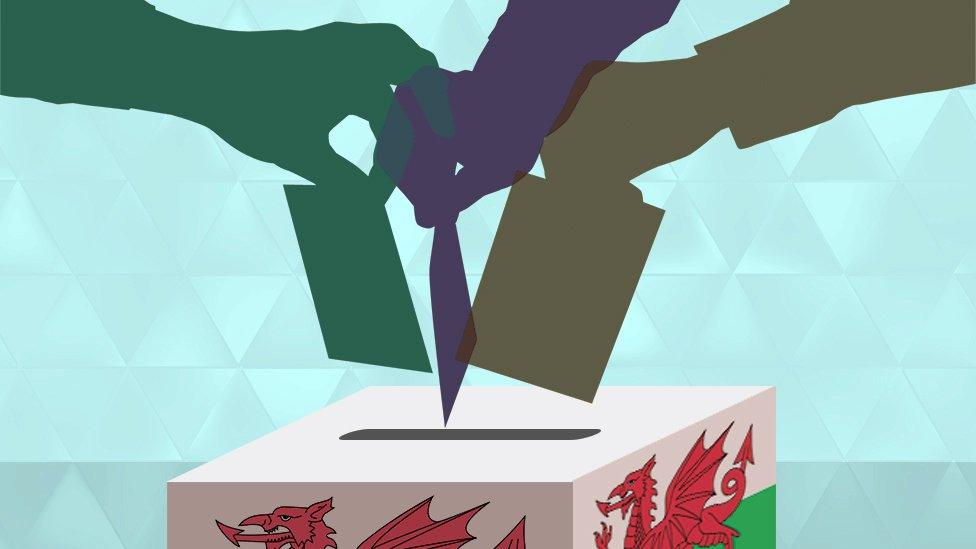A Brexit election? Polls, debates and known unknowns
- Published
- comments

It has been an election campaign like no other, with more than the usual twists and turns amid the slogans in the weeks before polling day. The volatility of the opinion polls has reflected the ups and downs of an extraordinary campaign.
I've spent most of the campaign covering the "air war" from Westminster. The two main candidates for prime minister have each confounded expectations. Theresa May started the campaign looking invincible but later struggled to communicate her message and ended up re-writing her manifesto within days of its publication. Jeremy Corbyn began the campaign as a leader whose own MPs doubted his ability to do the job and ended looking as if he was really enjoying it.
We'll find out on Friday whether any of this matters. Jeremy Corbyn's ability to attract a crowd and energise the left is not in doubt; his ability to win over voters from other parties is less proven.
'Holiday'
It was, for the Conservative leader, the most important general election in her lifetime. That didn't stop the leader of the Welsh Conservatives Andrew RT Davies going on holiday halfway through the campaign. I suspect we haven't heard the last of that, fuelled by internal disquiet over the admission of Mark Reckless to the Tory group in the Welsh Assembly.
Liberal Democrat leader Tim Farron didn't visit the only seat his party is defending in Wales - Ceredigion. The Lib Dems said this was because he was targeting possible gains (it's possible a Ceredigion visit had been scheduled for the days when campaigning was suspended).
Mr Farron went to Montgomeryshire on Tuesday to warn that the Conservatives' so-called "dementia tax" would threaten the future of the family farm. Just one problem - social care is devolved, as the Lib Dems know, but they were not alone in trying to confuse voters over devolved issues in this campaign. Theresa May came to Wrexham to re-shape her social care policy in England.
Plaid Cymru leader Leanne Wood was everywhere, although she decided against standing in this election. Whether it was the election debates, the Andrew Marr Show, the Daily Politics, Peston on Sunday, external, Victoria Derbyshire, Jeremy Vine, The World At One, Today or Woman's Hour, she has a bigger UK-wide profile than any other Welsh politician, one that must be the envy of her predecessors and possibly her parliamentary leader Hywel Williams, who is standing in this election but has been rather less visible. Mind you, it didn't stop UKIP leader Paul Nuttall calling her Natalie. We'll find out on Friday whether that Leanne Wood profile translates into votes.
Debates
What did we learn from the televised election debates? The biggest headlines were caused by Theresa May's absence. As someone who watches politicians debating with each other for his living, I thought the formats that worked best for viewers were those where a leader was put on the spot by voters rather than exchanged soundbites with their counterparts. My rule of thumb would be this: the more politicians involved in debates, the less illuminating the exchanges.
The main manifestos were curious. According to the Institute for Fiscal Studies, Labour's sums don't add up. The Conservatives didn't include any sums to add up.
There were detailed Tory pledges in some policy areas, vague ones in others - and some issues went unaddressed. There are a few known unknowns: will the Conservatives protect tax relief on pension contributions? Most of it goes to higher-paid workers and it costs £35bn a year.
Are the Conservatives still committed to cutting the numbers of MPs from 650 to 600 (in Wales from 40 to 29)? If it's in their manifesto, I missed it.
Priorities
There is the question of priorities. Labour are promising an "alternative Wales Bill" to rewrite (again) the devolution settlement. I get no sense of timing from the manifesto. I suspect that, whoever wins, Parliament will be so busy with Brexit that other legislative demands have to form an orderly queue.
Some of the campaign tactics were more effective than others. Do voters care about Jeremy Corbyn's past relationship with the IRA? One Conservative candidate told me that tactic worked well with "the UKIP demographic", and there are a lot of UKIP votes to harvest.
The campaign was suspended twice in response to terror attacks, which changed the focus of the subsequent arguments.
It was unusual in many ways. Bill Clinton's team used to say it was "the economy, stupid" that decided elections but the economy was far from centre stage this time. Debt and the deficit that featured so strongly two years ago barely got a look in.
And then there was Brexit, the reason Theresa May gave for calling this unscheduled election. On the last day of campaigning she reverted to her core campaign theme: who do you trust to get the best Brexit deal?
But we may be little the wiser about what that deal looks like - or how it could be secured - until negotiations begin. Whoever wins on Thursday, there are 27 other countries who want to have a say.